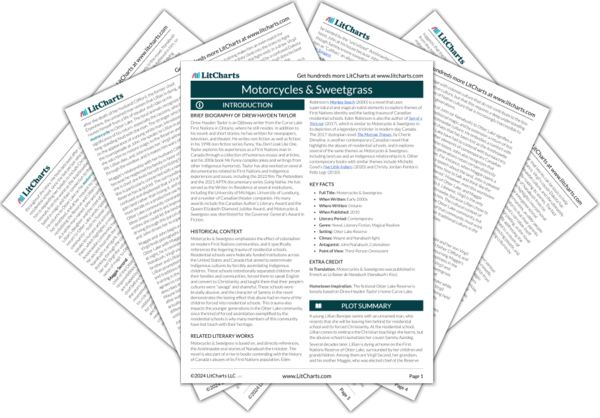Though Motorcycles & Sweetgrass explores serious topics, the narrative voice is consistently comedic, and characters’ conversations often transition from solemn to joking and back again. For instance, when Maggie visits Lillian on Lillian’s deathbed, their conversation segues frequently and rapidly between jokes about food and television, and serious discussions of family, community, and loss. Their easy rapport establishes the women’s comfort with each other, and it helps them have a meaningful discussion with each other despite the looming inevitability of Lillian’s death. Though Lillian is regarded as a wise old woman, she initiates many of these jokes, which indicates early in the novel that humor and wisdom are not mutually exclusive. In fact, the novel suggests that they nourish each other. The legendary Nanabush, for example, is both “a fool” and “a teacher,” imparting lessons even as he makes mistakes and revels in chaos. Under the guise of John, Nanabush himself advises Virgil, “Never underestimate the need for some sheer silliness,” adding that indulging in nonsense is the only way to stay sane. He describes drugs and alcohol as shortcuts to this nonsense, in contrast to the healthier option of keeping oneself open to humor and chaos. John’s advice and the function of humor in the story suggest that silliness can’t guard against the hardships of life, but rather that it can be an essential tool people can use to endure them.
Humor ThemeTracker

Humor Quotes in Motorcycles & Sweetgrass
“Making me wait is a luxury you won’t have much longer,” [Lillian] said in Anishnawbe, the language of her people. She spoke it like all the old-timers did, with strength and confidence, not hesitantly and softly like the youngsters who took the language in university, if they took it at all.
Maggie […] responded, also in Anishnawbe, but with not quite the same command. Still, she was more accomplished with her Native tongue than most of the community. If nothing else, that was the legacy Lillian and her husband, may his soul rest in peace, would leave behind. All their kids spoke the language––some better than others, but at least they spoke it. And in this day and age, that was their little miracle.

Unlock explanations and citation info for this and every other Motorcycles & Sweetgrass quote.
Plus so much more...
Get LitCharts A+“She was a very passionate young woman. Grandmothers aren’t born grandmothers. Wise men and women aren’t born wise––wisdom is something achieved over years of experience. And for some, that experience includes…skinny-dipping.”
“Unlike you, I’m trying to avoid dying. For my people, the novelty wore off several generations ago.”
“Your people are my people.”
“Tell that to all the priests and ministers who used to look after my people.[…]”
“[…] Well, blame free will and all that. […] [M]y friend, we both loved Lillian. I didn’t think we should be enemies. And many people seem to really want and love you, so I––“
“Sorry, but I am not loved like you are. I am not loved, I am beloved. There's a substantial difference […] When you’re beloved, you get all the same warm and fuzzies as you do when you’re loved, but there’s a lot less responsibility involved. […] You know, every parent wants their kid to grow up like you, but most of them are actually closer to me. Perfection is boring. Flaws are interesting.”
“[…] rumour has it the Department of Indian and Northern Development could be looking for a new minister. Anything is possible in politics. I like Native people, Kait. My parents used to have a lovely Algonquin lady clean our cottage once a week. I think she was Algonquin. I know she was Native. I’ve eaten deer. I have that leather vest. I’ve been to a powwow. I know the score.”
“Who is Nanabush, to you? You tell me.”
Virgil mentally went through all the stories his grandmother had told him over the years, and also through what he’d read recently. “He’s a hero, a fool, a teacher, someone silly, someone clever––my grandmother would say he’s us.”
“You know, I never thought I’d see the day when Native people would be paying good money for something as available as water. White people I understand. They like to buy and own everything, but man, Native people too? That’s when you know something is wrong.”
“Never underestimate the need for some sheer silliness,” said John. “That’s why some people drink. That’s why some people take drugs. Of course that's the cheap way out. A good bout of complete nonsense now and again would keep everybody sane. You can quote me on that.”











